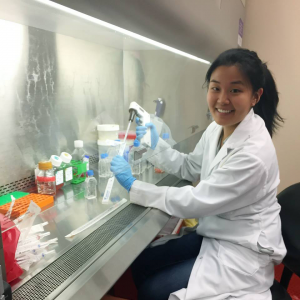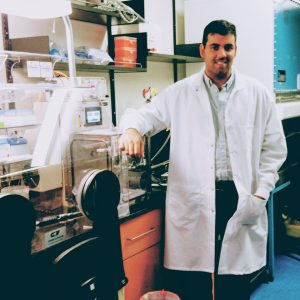As summer comes to an end, so does a BioCanRx-funded 14-week research internship in cancer immunotherapeutics for 15 bright and enthusiastic undergraduate students. We are incredibly proud of the learning and development our summer students achieved and wish them all the best in their future endeavours.
Here’s a taste of what two students were up to this summer and what they gained from this studentship. Meet Angela Cheng, who worked with Dr. Brad Nelson at the Deeley Research Centre in Victoria, BC, and Mankerat Singh, who worked with Dr. Byram Bridle at the University of Guelph!
1. Who are you? Where do you go to school? What’s your program? One fun fact about yourself!

Angela Cheng (AC): Hello! I am Angela, and I am proud to say that I was born and raised in the small town of Port Alberni. I moved to Victoria four years ago to start school at the University of Victoria. Currently, I am wrapping up my final co-op work term, and will be graduating this November with my Bachelor of Science in Microbiology. A fun fact about myself is that I secretly love Nickelback.
Mankerat Singh (MS): My name is Mankerat Singh and I’m an undergraduate student in the Biological Sciences program at the University of Guelph. This summer I had the opportunity to do a research project in Dr. Byram Bridle’s lab, where I investigated the effects of hypoxia on dendritic cells (DCs). Outside of the lab, I have many interests and hobbies one of which is agriculture, despite having lived in the city for nearly my entire life. My love for farming comes from spending my summers at my ancestral village, where there are thousands of acres of breathtaking orchards and farm fields.
2. Why did you want to do cancer research this summer?
MS: I wanted to pursue cancer research because I have a strong interest in human health and medicine. I’ve previously done cancer research, studying the regulation of pro-apoptotic proteins through micro-RNA’s. Over the past year I’ve had the opportunity to specialize in cancer immunotherapy, with my work being focused on DC vaccines, interferon responses, and oncolytic virus research. Cancer is the second leading cause of death globally, being responsible for 1 in 6 deaths. I wanted to contribute my time during this summer towards pursuing research that would ultimately benefit cancer patients by increasing the efficacy of DC vaccines.
AC: I think that cancer is a disease that intrigues everyone, given that it impacts so many lives, with no guaranteed cure. For me, interest in this field bloomed during an immunology course taught by my current supervisor, Brad Nelson. While learning about the intricate workings of the body that prevent cancer from arising, I found myself asking how we can regain this balance when things go awry. From there, I started my honours project with the Nelson lab, which led to this summer work term.
3. What did you work on this summer? What did you discover?
AC: This summer, I investigated the relationship between the tumour microenvironment and immune activity in high-grade serous ovarian cancer, focusing on markers of stromal activity and epithelial-mesenchymal transition. During this time, I was able to develop a novel protocol for digital analysis of tumour tissue microarrays stained by immunofluorescence.
MS: My work over the summer has been very informative in showing us how DCs respond to hypoxic microenvironments, once they are injected at peripheral locations in cancer patients. We have seen that proinflammatory cytokine production, and cell viability are both decreased when DCs are exposed to hypoxia post stimulation. In clinical trials of DC vaccines some groups have reported that as little as 5 % of DCs are successful at migrating to proximal lymph nodes while the remainder die or remain idle post injection. Our results show that the physiological oxygen conditions in the patient’s body, contribute to the death and inefficacy of DC vaccines post administration.
4. What was one memorable moment from this past summer during your studentship?
MS: The most memorable and enjoyable experience during this summer was attending the 2017 Summit for Cancer Immunotherapy. Attending the conference not only exposed me to some of the most cutting-edge research in the field, but also exposed me to areas that warrant further study and sparked ideas of potential research projects. Additionally receiving an award for my research from BioCanRx at the Summit, was an incredibly gratifying experience, which further boosted my confidence for pursuing research during my career.
AC: I am constantly impressed by the amount of effort made by my colleagues to plan and execute team socials. While social events may not seem directly science-related, they certainly encourage a healthy work-life balance, which is the key to long-term success, and a big contributor to the thriving environment of our lab. The most memorable moment from this summer was when our lab went camping. A shining sun, flowing river, and amazing company – what more could you ask for?
5. How did this research experience impact your career development?
AC: This opportunity has helped shape the future physician I hope to be. Immediately, I felt challenged and pushed as I strengthened skills including time management, critical thinking, and public speaking. Additionally, I was exposed to the honest realities of cancer. Our lab is located within the hospital, constantly reminding us who our work is for. Being able to see both sides (the research and the patients it serves) has impacted me most, encouraging me to be a physician that bridges the two; someone that is knowledgeable in the mechanics behind treatments, but also able to demystify the process for patients.
MS: Having developed a strong background in the field, I plan to have medical research as a significant component of my career. The BioCanRx studentship has given me excellent exposure to the field of cancer immunotherapy and has contributed greatly in laying my career’s foundation. I believe the next generation of researchers and clinician scientists will need to emphasize and consider human physiology and disease-specific microenvironments. Due to this I consider myself very fortunate to have gained experience in the field of hypoxia, as I believe that, to date, the scientific community and clinician scientists have largely ignored the importance of considering physiological oxygen conditions when conducting medical research and designing therapeutics.
6. What is your hope for cancer treatment/care in the future?
MS: I see tremendous potential for specializing in cancer immunotherapy during my career, and believe the field will continue to produce effective cancer therapeutics in the future. I am optimistic that in the years to come there will be a significant increase on emphasizing physiological conditions of patients by the scientific community and clinician scientists, when conducting cancer research. Considering patient physiology when designing cancer therapeutics will improve treatment efficacy, reduce the risk of adverse side effects, and should prove to be a cost effective strategy to improve patient outcomes.
AC: I think it is safe to say that we all hope for a future where a cancer diagnosis can easily be prevented or treated. This may occur through continued efforts to improve screening and prevention methods. As technology improves, data storage and analysis will be possible on larger scales, allowing a holistic understanding and comparison of different cancers. Increased stratification of the disease will be possible, allowing more personalized and targeted treatments. Significant progress has already been made, and I am hopeful that there is much more to come.
